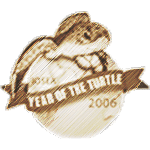World's Biggest Fish "Shrinking"
| By Richard Black Environment Correspondent, BBC News website, Darwin |

In a decade the average size has shrunk from seven metres to five metres.
Whale sharks, the world's largest fish, are caught for food in some east Asian countries and Australian researchers suspect this is causing a decline.
The fish is listed as "vulnerable", and one of the authors of the new study has described the new finding as "a very worrying sign".
The data comes from ecotourism companies which run expeditions to watch whale sharks and swim with them in Ningaloo Marine Park off the north-west coast.
"The eco-tourism industry logs the position and size and sex of every shark it swims with," said Mark Meekan of the Australian Institute of Marine Science (Aims).
"We have obtained those datasets and analysed them over time," he told the BBC News website, "and essentially what we have seen in the last decade is a decline in average size of shark from seven metres to five metres.
"Now if you consider that the sharks probably aren't sexually reproductive or mature until they're six or seven metres long - that's a very worrying sign."
Looking for options
Whale sharks (Rhincodon typus) are filter feeders, eating small marine organisms such as krill.
They can live for up to 150 years, attaining lengths of up to 20m, and are believed to reach sexual maturity around the age of 30.

"Whale sharks, like many other shark species, are highly vulnerable to over-exploitation due to their long lifespan and low reproductive rate," commented Callum Roberts of York University in the UK, who has researched whale sharks extensively in the Caribbean.
"They have been added to CITES list of species threatened by international trade," he told the BBC News website, "but this will not protect them if they are caught by, for example, Taiwanese vessels and then consumed in Taiwan.
"So whale sharks are at risk, and the decline in size might be due to capture of large sharks."
There are also indications that the number of sharks visiting Australian waters may be decreasing, which would be additional evidence for a decline prompted by over-fishing.
Playing tag
Aims researchers are running a tagging programme in an attempt to plot whale shark migration routes between Australia, Asia and the eastern coast of Africa.
Specimens tagged in Australia have swum to Asian waters; last month a tag transmitted for days from the same location in Indonesia, apparently on land, leading researchers to suspect that the shark had been caught and the tag removed.
Either the meat is eaten, or the giant fins used as advertising boards for restaurants serving shark fin soup; livers are used for oil, and cartilage in traditional Chinese medicine.
Finding migration routes could help pinpoint areas where they are being caught.
"Many of the people doing the fishing are just local villagers with no other option," said Mark Meekan.
"If we know who they are, we can give them another option, and that option is very lucrative; the ecotourism industry in Ningaloo generates AU$70m (£28m; US$50m) a year, enough to support an entire town."
Longer term objectives of the Aims programme include finding out more about the life cycle of the whale shark.
The biggest mystery concerns breeding and reproduction; males and females live in largely segregated communities, but must come together somewhere to breed.
















0 Comments:
Post a Comment
<< Home